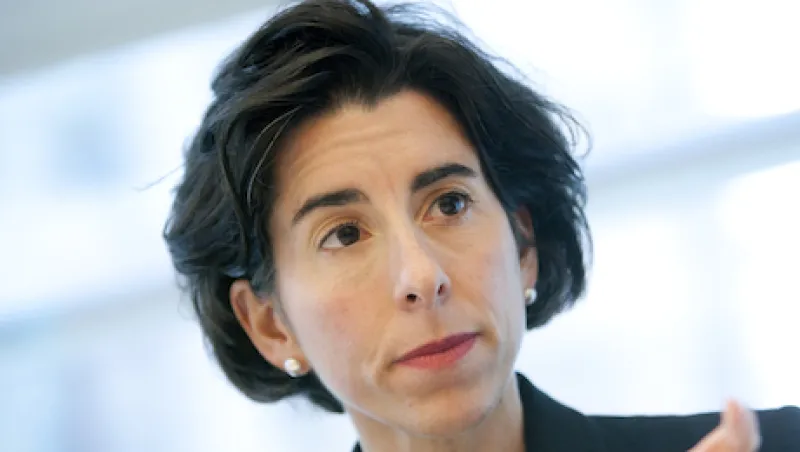Angel Taveras, the ambitious mayor of Providence, Rhode Island, has been criticizing his rival in the Democratic gubernatorial primary, Rhode Island General Treasurer Gina Raimondo, for the ways she has gone about reforming a troubled state pension fund. But many of the investment practices the mayor has accused Raimondo of, including paying high fees and allowing possible consultant conflicts, took place at the $272 million Providence pension plan. Taveras is the chairman of the plan’s six-person oversight panel, the Board of Investment Commissioners.
In this, the second of a three-part series, Institutional Investor examines the collision of politics and pensions swirling around the Providence pension system. Both Rhode Island and Providence undertook difficult, high-profile reform efforts over the past few years as their pension systems edged closer to insolvency. Today those efforts have become a political issue in the seemingly dead-heat Democratic primary pitting Taveras against Raimondo. Many of the most contentious charges swirl around relationships with hedge funds by the state’s Employees’ Retirement System of Rhode Island.
On June 6, 2013, Taveras attended the monthly meeting of the Board of Investment Commissioners, only the third time he had been present since taking office in 2011. At that meeting he asked Eric Bertonazzi, the chief investment officer of Boston-based investment advisory firm Wainwright Investment Counsel and the adviser to the pension system for almost 20 years, for information about hedge fund investments. Specifically, Taveras inquired about fund performance and whether it was possible to find investments that produced the same level of risk-adjusted returns but lower fees, and if any of the hedge funds used placement agents or third-party marketers to win business. Five months later, at the November meeting, the board voted to drop one of its hedge fund managers, Graham Capital Management, and move the $4.3 million allocated to that firm to the lower-fee Renaissance Institutional Equities Fund (RIEF). The decision was made in response to Taveras’s fee inquiry, though the mayor had not objected to Graham’s fees when the pension invested in the manager a year earlier.
The mayor’s spokesman, David Ortiz, says the mayor made the request “after reading reports in the Wall Street Journal and other national media about concerns over hedge funds.” Between January 1 and June 6, 2013, the Wall Street Journal wrote only one relevant article, a June 1 Weekend Investor column, on the subject of hedge funds and fees. However, one news outlet that did produce a widely read article in Rhode Island political circles on the subject was Forbes.com. In April 2013 Edward Siedle, a forensic accountant who writes a blog at Forbes.com, posted a blog titled “Rhode Island Public Pension ‘Reform’ Looks More Like Wall Street Feeding Frenzy.” The blog lampooned the decision by the state pension fund to invest in hedge funds. In June Rhode Island Council 94 of the American Federation of State, County and Municipal Employees (AFSCME) AFL-CIO hired Siedle to write a report on the state pension plan.
Siedle’s AFSCME report, “Rhode Island Public Pension Reform: Wall Street’s License to Steal,” was harshly critical of Raimondo and her decision, as chair of the State Investment Commission, to authorize investing 15 percent of the state’s $8 billion with hedge funds. The report argued that the hedge fund strategy boosted fees and paid millions to “Wall Street” while not improving returns, and insinuated that the state’s hedge fund investment consultant, Marina del Rey, California–based Cliffwater, was taking fees from managers it recommends.
Over the past year Raimondo’s critics have continued to attack the treasurer, who ran a venture capital firm before taking public office, for her ties to hedge funds and the alternative-investment industry. This June, after the Massachusetts state pension plan replaced Cliffwater with a lower-cost adviser, Taveras’s office issued a press release asking why Raimondo was “standing by” Cliffwater and falsely alleging, citing Siedle’s report, that the consultant receives payments from hedge funds it recommends. “It raises serious questions about her relationship to the industry,” Taveras’s communications director, Dawn Bergantino, said in the statement. “She [Raimondo] hired a Wall Street firm that gets paid for recommending certain hedge funds as a chief adviser. Is she just taking them at their word that this conflict of interest hasn’t happened in Rhode Island? With these kinds of questionable business practices, why would she hire them in the first place?”
The charges were dramatic and seemingly damning. The problem was, Cliffwater doesn’t take placement fees from hedge funds — Taveras’s team eventually walked the charge back — though Providence’s Wainwright Investment Counsel does.
None of this is illegal; in fact, in past decades it was quite common. The acceptance of fees, with its potential for conflicts, however, has become a sensitive issue throughout the pension industry and has been widely phased out of institutional asset management, in part because of investigations by Siedle and others. The Rhode Island hedge fund portfolio, in fact, represents current best practices on that score.
In the city’s case, Ortiz says Wainwright does not charge placement fees to its public pension clients. Further, he insists, Wainwright, which also operates a broker-dealer subsidiary and acts as an administrator for third-party funds (also once common in consulting practices that have since come under scrutiny from the Securities and Exchange Commission), “does not have any conflicts with regard to any aspect of its consultant relationship with the city.”
Why the contention? That’s where the politics comes in. Raimondo was a leader of the reform effort at the state level, which demanded substantive changes — including a defined contribution plan — that angered organized labor. AFSCME then hired Siedle for more than $23,000 in consulting fees in 2013 to write the report. The union is still fighting the state in court over pension reform.
Taveras, meanwhile, took a different path in Providence, though a riskier one over the long term. He also pushed a reform program, though it was one that went easier on organized labor, which eventually accepted the plan. The downside, however, is that the city has a funding ratio of less than 35 percent and faces a far tougher road to full funding than the state (see “Pension Reform in Providence, Part One: The Reform Process”). The city pension assets are all the more perilous because the need to pay existing benefactrices means that the fund has an exceptionally high burn rate. The city pension is paying out more than $7 million a month, leaving it little or no runway to absorb significant investment losses.
And it’s not as if Providence has had no contact with “Wall Street” hedge funds. The Providence plan began investing in hedge funds at the recommendation of Wainwright’s Bertonazzi in 2001, placing $21 million with three hedge funds, none of which was a well-known institutional manager: Forest Investment Management, Catalyst Partners and TQA Investors. The fund also invested in a Seattle-based fund-of-hedge-funds manager, Quellos Group, with which Bertonazzi has said he also had private client money.
Providence no longer uses the three original hedge funds — it redeemed from Catalyst in 2003 after the fund lost 70 percent of its capital — but it remains with Quellos, with an $11.1 million portfolio. Today Quellos is owned by the $4.3 trillion in assets money management firm BlackRock, based in New York. Although Quellos’s fees are lower than some other fund of hedge funds — it charges Providence up to 2.5 percent, depending on performance — the fact that it is recommended by a consultant means the city pays three layers of fees: to the underlying hedge funds, the fund of funds and the investment consultant. In 2012 Quellos charged Providence $78,164 in fees. The fund of funds returned 7.74 percent for the city that year.
One investment firm Bertonazzi did not recommend to the city: that of Bernard Madoff, now in prison for a multibillion-dollar investment scam. According to Bertonazzi’s Financial Industry Regulatory Authority (FINRA) record, the investment adviser did put at least one client into Madoff’s Ponzi scheme through a feeder fund, Gaspee Offshore Fund. That feeder fund invested with Madoff via Fairfield Greenwich Group, a New York–based asset management and investment advisory firm. According to the available meeting minutes the Board of Investment Commissioners never discussed Madoff with Bertonazzi, or questioned his decision to place a client in the feeder fund.
After New York–based Renaissance Technologies launched its institutional equity product, RIEF, Bertonazzi pitched it to Providence. According to January 2006 meeting minutes, he said he had clients who invested in Renaissance’s flagship fund, Medallion, which has long been closed to outside money and is one of the top-performing, highest-fee managers in the world. Now, with RIEF, he had the opportunity to get the city into at least part of Renaissance’s holdings.
Today the Providence pension has $31 million invested with RIEF, or 11.5 percent of the total fund, its largest single allocation. Whereas RIEF’s recent performance has been good — the fund returned 16.87 percent in 2013 — it initially disappointed. Despite a bull equity market for much of its existence, the annualized return since its July 2005 inception is 7.6 percent, helped by 2011, when it rose 34.12 percent. Given the amount of money from the city in RIEF, its inconsistency could be a problem. On the plus side: Renaissance has never paid Wainwright placement or marketing fees.
A big reason for investing in hedge funds — the reason the state decided to make that move in 2012 and why the city put money into them 11 years earlier — is to diversify and avoid a high correlation with equity and bond markets. At the February 2012 Board of Investment Commissioners meeting, which Taveras attended, the topic of fees did not come up when Bertonazzi recommended Graham Capital. Graham Global Investment Fund II, the fund in which the city invested, charged a management fee of 3 percent and a 25 percent performance fee — far higher then the 2-and-20 standard for most hedge funds.
Another piece of information Taveras asked for at the June 2013 meeting was a direct performance comparison between the city and state pension plans. (At the time, neither Taveras nor Raimondo had declared their intention to run, but it was widely anticipated that both would.) Had Taveras attended the next Board of Investment Commissioners meeting, on June 27, he would have been delighted to hear that the city had outperformed the state. For the calendar year through December 31, 2012, the city fund returned 19.6 percent compared with 14.1 for the state; the city’s three-year annualized return was 10.9, compared with 9.2 percent for the state. The city’s five- and ten- year annualized returns also beat the state.
Whether that continues no one can predict. The city pension system has 57.6 percent of its money invested in equities, which it needs to achieve an 8.25 percent assumed rate of return. This situation is accentuated by the equity-driven RIEF. If equity markets slip and volatility increases, it may be difficult for the city to hit that hurdle. The city was up 17.5 percent for the fiscal year 2014.
When it comes to managing the city pension fund, Taveras’s campaign spokeswoman, Bergantino, dismissed out of hand the idea that any of the mayor’s actions might have been politically motivated, saying, “The mayor makes decisions based on what is best for the City of Providence, not based on politics. The assertion that he would do otherwise is ludicrous.”
As a fiduciary, Taveras has a legal obligation to monitor how the city’s pension assets are being invested and to ensure that they are being managed prudently. Yet until it became politically expedient to do so, the mayor showed remarkably little interest in the city’s pension assets — or the state’s, for that matter. Instead, in recklessly lobbing charges at Raimondo and the state pension, Taveras inadvertently pointed out flaws in his own fund. Politics does make strange bedfellows, particularly when it comes to pensions and hedge funds.
Follow Imogen Rose-Smith on Twitter at @ImogenNYC.
Get more on pensions and on hedge funds.






